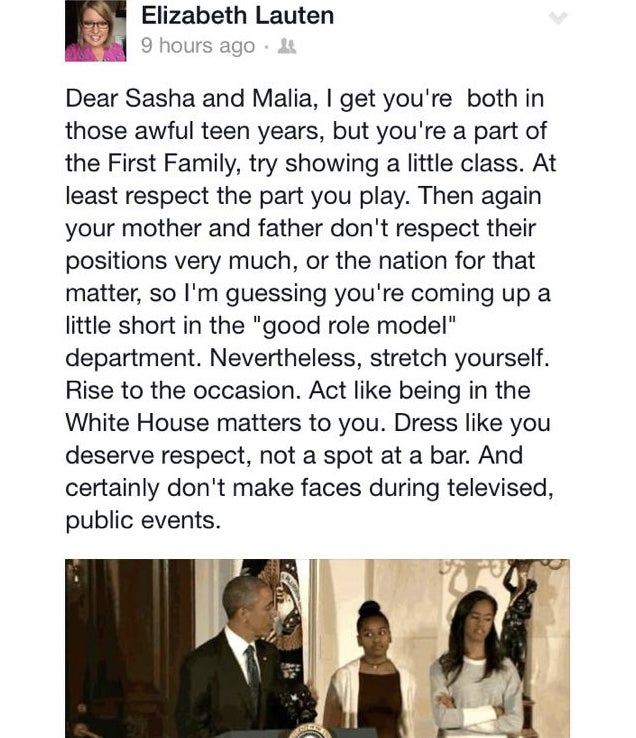“According to Lee Rainie and Berry Wellman, communities online are a new social operating system that gives rise to ‘networked individualism’ because, when you are in a community online, it is personal and individual and for multiple simultaneous users multitasking in the environment” (Cohen & Kenny 10). Diving a little deeper into the idea of “networked individualism”, I found that what it actually means is the transformation from group-based networks to individualized networks.
I have to disagree with the notion that being a part of an online community is personal; in fact, I think its welcoming to outsiders or those who share similar interests because essentially, users of the digital realm are producing content onto the World Wide Web for anyone and everyone to see. For instance, Republican staffer Elizabeth Lauten took to Facebook to criticize President Obama’s daughters. Take a look at the photo provided below.

After reading her comment, what is your prospective on what she said?
Her comments created a media uproar of social media backlash with people taking it as far as saying she deliberately cyber bullied Sasha and Malia Obama; causing her to delete the post, set her social media account to private, issuing an apology online and finally, resigning. Cohen and Kenny make it a point to explain that “the content or material discussed through text, displayed through visuals, or heard through sound captures the imagination of the web user” in that case, giving digital users the freedom to express themselves freely without sugar coating over anything (10). Elizabeth Lauten did not sugar coat how she felt, as millions of others do everyday without thinking but writing in a digital space where she felt comfortable enough to speak openly to a community online. Unfortunately, what she had to say, not many people took a liking to it.
Technology is rapidly changing the way business is being handled and social media has become the dominate form of communication. Countless numbers of businesses use social media such as Facebook, Twitter, and Google+. Social media can act as a customer service tool allowing consumers to interact with product from a specific company. At the same time, these companies must be mindful of balancing an employee’s privacy against the employer’s security. “In social media employees, should be transparent about what they are doing and why” because anything can happen, ideas or opinions can be misconstrued, taken out of context, and it effects negatively not only on the employee but the organization as well (Carroll 250). Recognizing that nothing on the web is truly private should have digital users stopping and asking themselves what is worth putting online for everyone to see.




Fola I love your example in regards to social bullying and how we’re precived online, it reminds me of the actress who slandered Zendaya for getting her own barbie doll. Her tweets were quickly shared and retweeted and before she knew it her entire rant was being used against her and she ended up deleting them. I think people especially people in public eye forget that social media is as much a reflection of them as walking the red carpet is. Further proof that social media is quickly becoming a stanard way of life in this country.
Fola I think it’s personal and individual to the extent that we get to say what we want to say, except on the job, but your right in that once posted, it is no longer personal and can end up anywhere.
Right, in the workplace different standards and requirements are applied. If you have to so much as think if what you’re about to post will effect negatively upon yourself or your job, its best not to post at all. Deleting it won’t solve the problem either because people are so quick to screenshot, share, like, and re-tweet anything.
Fola, this is an interesting post. Some thoughts:
I’m glad that you took it upon yourself to research “network individualism” a bit more, and that you now have a better understanding of the concept. Could you cite/link us to your sources, so we can have that context too? For example, here is a good discussion of it from Pew Internet and American Life: http://networked.pewinternet.org/2012/05/24/networked-individualism-what-in-the-world-is-that-2/ (it’s actually the source Cohen & Kenny cite on p. 9). (Also, don’t forget to cite your other sources (in this case, the FB screenshot), with a link back, if possible.)
You bring up a number of interesting points here, but it is hard to see how they all fit together (each point/paragraph feels a bit disconnected from the rest). In your next post, work hard to connect the dots more for your readers (using transitions will help).
Also (re: title and tags): is this post really about the workplace? Yes, it is true that the example you provide is sort of in the workplace, but it seems to raise larger issues about social media. Is there a more appropriate title? And for tags, maybe some additional ones? “networked individualism” perhaps?
Thanks for the feedback!
Great post Fola. I find it so interesting that although we call social media in places of work (places of actual social interaction) we are so taken back by the idea of it. Do you think this will ever change?